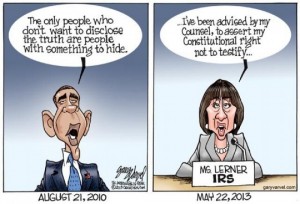The timeline of the Internal Revenue Service targeting of conservative groups reveals nothing less than a scandal. It is a scandal that blew into public view a year ago this week and about which the press has been far from curious.
In 2009, the president of the United States commented in a commencement address that the IRS would soon be auditing the president of the university and the Board of Regents for refusing to grant him an honorary degree. Supporters of the president dismissed critics who worried that the “joke” was a “dog whistle” intended to declare open season on the president’s political opponents.
In January 2010, the president in his State of the Union Address publicly berated the six Supreme Court justices in attendance for their decision in Citizens United, which held that the First Amendment prohibits the government from restricting independent political expenditures by corporations and labor unions.
In the wake of Citizens United, many political groups formed in opposition to the president applied to the IRS for tax-exempt status under section 501(c)(4) of the tax code, which does not require the disclosure of donors. Senators of the president’s party called on the IRS to investigate these groups.
In March 2010, employees in the IRS branch office tasked with reviewing applications for tax-exempt status were instructed to give special scrutiny to certain applications for 501(c)(4) status, later memorialized in a “Be on the Look Out” (BOLO) list of targeted terms. Over the next two years, the IRS slow-walked the applications of many such groups, limiting their ability to participate in the 2010 and 2012 political campaigns.
In March 2012, the IRS commissioner testified before a House committee that there was “absolutely no targeting” by the IRS of political organizations opposed to the president. The subcommittee chairman requested the Treasury Inspector General for Tax Administration (TIGTA) to investigate. The IRS commissioner resigned later that year.
On May 10, 2013, four days before the public release of the TIGTA report, the IRS director Exempt Organization Director (IRS director) apologized for the “absolutely inappropriate” actions of low-level IRS branch office employees and denied any involvement by high-level IRS officials in Washington, D.C.
On May 14, 2013, TIGTA publicly released its report detailing the IRS’ inappropriate targeting of the president’s political opponents. The president directed the secretary of the Treasury to hold accountable those IRS employees responsible for the targeting, and the attorney general announced that the Department of Justice would launch a criminal investigation. The following day, the acting IRS commissioner resigned.
On May 22, 2013, the IRS director asserted her Fifth Amendment privilege against self-incrimination and refused to testify before a House committee. She was placed on administrative leave. The following month, it was revealed that she received a $42,000 bonus. She retired in September.
On Jan. 9, 2014, it was revealed that the Department of Justice attorney leading the investigation was a donor to the president’s campaigns. A week later, the Justice Department revealed it would not bring any criminal charges. Attorneys for many of the targeted political groups complained that they had never been contacted in the investigation.
On Feb. 2, 2014, the president stated in a televised interview before the Super Bowl that although there “were some bone-headed decisions out of a local (IRS) office … (there was) not even a smidgen of corruption.”
On May 7, 2014, the House voted 231-187 to hold the former IRS director in contempt of Congress for refusing to cooperate in its investigation (six members of the president’s party voted with the majority). The House also voted 250-168 to request the attorney general to appoint a special prosecutor to investigate (26 members of the president’s party voted with the majority).
To paraphrase Matthew McConaughey in A Time to Kill: Now imagine the president is a Republican.
We’ve already seen that movie, and it was called Watergate.
In that scandal, aggressive reporting by the media and thorough investigations by the FBI, Justice Department and a Senate Select Committee painstakingly uncovered the facts of the illegal break-in at the Democratic National Committee’s headquarters months before the 1972 presidential election. One of the three articles of impeachment charged that President Nixon had attempted to use the IRS against his political opponents.
Today’s news media are largely ignoring the IRS scandal, and it is impossible to have confidence in the current investigations by the FBI, Justice Department, and House committee. I am not suggesting that the current scandal in the end will rise to the level of Watergate. But the allegations are serious, and fair-minded Americans of both parties should agree that a thorough investigation needs to be undertaken to either debunk them or confirm them.
. . . . . . . . . . . . . . . .
Paul L. Caron is professor of law at Pepperdine University. This article was published at USA Today.
